Lawrence Block's Blog, page 2
March 17, 2023
Spring Forward! Fall Further and Further Behind!
I suppose you’re referring to Daylight Savings Time.
I am, and its return always sparks joy, although I’d be hard-pressed to tell you why. It seems to promise extra hours, but I’ve never been able to find more than the usual twenty-four in a day. And even those hours that crawl are over all too quickly, and the weeks and months pass in a flash, and don’t ask me where the years go.
I wouldn’t dream of it.
I’m here to wish you all the joys of St. Patrick’s Day, which means the equinox is hard upon us, and how far off is the summer solstice?
It ought to be three months.
Wouldn’t you think so? But just wait and see how quickly the future turns into the past. Why, there’s barely time to preorder The Autobiography of Matthew Scudder before it’s published on June 24th.
I was wondering where you were going with this.
It’s a difficult pitch to make, because it’s a book I never expected to write, and not an easy one to describe. On the one hand I think it’s one of my very best, a judgment in which my small corps of advance readers seems to concur. At the same time, I can’t see it as having a very large prospective audience; I don’t imagine anyone who’s not already a reasonably ardent Scudder enthusiast would have much reason to read it.
It was really Madison Avenue’s loss when you opted for a career as a novelist.
You think? I couldn’t figure out how to sell this one, and I thought about rounding up enthusiastic quotes—but I hate to do that, because I don’t give blurbs myself, so where would I get off asking for them? Then it struck me that the best thing to do was let the book speak for itself, so I’ve posted the first 3000 words on my website, where anybody’s welcome to read them. That’s about 5% of the complete book, and if you read that much you’ll probably know whether or not you want to read more.
And then we preorder the book?
Or not. The ebook is available for preorder on most platforms — AMAZON APPLE KOBO BARNES & NOBLE THALIA VIVLIO SMASHWORDS — at an advance price of $9.99.
And I suppose that price will go up after June 24th?
No, it’ll probably stay at $9.99. Any day now you’ll be able to preorder the paperback, and its price will be $17.99.
And after publication?
No change. Still $17.99.
I don’t get it. What’s the advantage of preordering?
I’m not sure there is any. Oh, it does protect you against a price increase, but I don’t honestly anticipate one. I guess the main advantage is that you’re guaranteed to be the first member of your granfalloon to read The Autobiography of Matthew Scudder. And you’ll also be spared the need to scribble “Buy Scudder Autobiography” in your calendar for June 24.
So I won’t need to tie a string around my finger as a reminder. Do people still do that?
Did they ever? Look, I realize this isn’t the best sales letter I’ve ever perpetrated, and maybe that’s as it should be. Just because the book’s a hard sell doesn’t mean a hard-sell approach is the answer.
As I’ve said, I think highly of the book—and it seems to me I may have done something that hasn’t been done before. (After I’d completed it, I was to discover that it’s not the first work purporting to be the memoir of an existing fictional character. Georges Simenon published Les Mémoires de Maigret in 1950. I managed to locate a copy, and found that it was, well, not very interesting. As an admirer of both Simenon and his Inspector Maigret—I spent a very pleasant evening some years ago discussing the Belgian author and his work with Pete Hamill before a small but enthusiastic Brooklyn audience—I’d wanted to like the book; all the same, it was with some relief that I found it surprisingly dull.)
Um, where was I?
I think you said Brooklyn.
I’m not even sure it was Brooklyn, but I remember we had a good time saying nice things about Simenon. But getting back to the Scudder autobiography—
There’s a thought.
—I’ll be going to a midtown studio next week to record the opening of the Dreamscape Audiobook. Peter Berkrot, who’s narrated many of my audiobooks (including A Writer Prepares and Dead Girl Blues) will give voice to Matthew Scudder, while Romy Nordlinger has a sparkling cameo as Elaine.
So there’ll be an audio version, and it’s shaping up to be quite a production. Nice of you to share that with us. When’s the audiobook coming out?
June 24th, same as the ebook and paperback.
Your birthday.
I know, and how’s that for a coincidence? There’ll be a deluxe signed-and-numbered hardcover edition from Subterranean Press, too, but there’s no release date scheduled yet. I’ll let you know when there is.
In the meantime, check out the first 3000 words of The Autobiography of Matthew Scudder. See what all the fuss—or lack thereof—is about. Preorder it—or don’t. What’s the matter? Why are you looking at me like that?
Two words, LB. Wishy washy.
Two words? Are you sure? Doesn’t it have a hyphen? I’ll have to look it up. . .
Cheers,
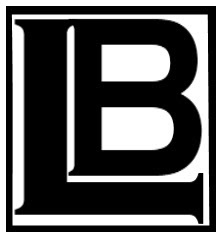
PS: As always, please feel free to forward this to anyone you think might find it of interest. And, if you yourself have received the newsletter from a friend and would like your own subscription, that’s easily arranged; an email to lawbloc@gmail.com with LB’s Newsletter in the subject line will get the job done.
LB’s Blog and Website
LB’s Facebook Page
Twitter: @LawrenceBlock
March 1, 2023
Beyond Roald Dahl and Ian Fleming…
There’s been a fair amount of media attention paid lately to the decisions of the estates of both Roald Dahl and Ian Fleming to make extensive edits to their respective bodies of work with an eye toward improving passages that might strike a contemporary reader as racially insensitive or otherwise offensive. I don’t feel moved to comment on either the original texts or the seemliness of changing them, but wanted to share a comparable move by an overseas publisher; perhaps because the work in question is in a language other than English, the following announcement has been largely overlooked by the linguistically insular American press:
Frankfurt, February 26: Representatives of Mehliger-Mund Verlag, the esteemed publisher, announced today the impending publication of Unsere humanitär Aufgabe, slated for reissue in early 2025, exactly 100 years after its original appearance.
“The book has stood the test of time,” said Mehliger-Mund’s spokesman, Heinrich Labberig. “Written during its author’s forced isolation after his initial emergence as a philosophical and political innovator, it has long since earned a permanent place on the shelf of German classics. But times change, and various textual idiosyncrasies, perfectly acceptable in 1925, have the unfortunate effect of alienating the reader of today.”
The challenge, Labberig explained, lay in judiciously ameliorating the author’s text without diluting its timeless message. “It is undeniable,” he said, “that the original text singled out for disparagement a particular segment of the German population. In the author’s defense, one might point out that he was doing little more than expressing the national consciousness of the time. Our attitudes on matters of race and religion have changed dramatically over the course of the past hundred years, and strict preservation of the author’s original text could make him appear bigoted—even antisemitic—in the eyes of the Twenty-first Century reader.”
In addition, the text itself has been toned down. Consider the following selection, thus in the original: “The application of force alone, without support based on a spiritual concept, can never bring about the destruction of an idea or arrest the propagation of it, unless one is ready and able to ruthlessly to exterminate the last upholders of that idea even to a man, and also wipe out any tradition which it may tend to leave behind.”
In the new edition, it’s softened somewhat: “The application of force is by no means the only way to change people’s minds and open them up to new ideas.”
When asked about the book’s new title, Herr Labberig admitted the risk in changing a phrase that had indeed become part of the world’s consciousness. Unsere humanitär Aufgabe—in English, Our Humanitarian Mission—does not readily call the original to mind. “But we felt it was an essential modernization,” he contended. “The author spoke as a lone voice, and so used the first-person singular, but he was in fact speaking on behalf of a whole people, as the plural Unsere affirms. Similarly, Aufgabe stresses that he is writing about a mission, a task, a higher purpose; a hundred years ago, given his personal circumstances, it is more than understandable that he proclaimed this to be a battle—but the word strikes today’s ear as harsher and more confrontational than one would prefer. As for the adjective, humanitär—well, given the book’s history, we felt it important to label the author’s mission as humanitarian.”
Update—Frankfurt, February 27: Heinrich Labberig, speaking on behalf of Mehliger-Mund Verlag, said it was “quite understandable” that the announcement of the impending publication of Unsere humanitär Aufgabe had occasioned a groundswell of outrage. “For many people,” he said, “the original text has taken on the aura of Holy Writ, and amending it has been likened to burning a religious scroll. But all should be assured that the original will continue to be available, and, in fact, simultaneous with the new version, Mehliger-Mund will be bringing out a deluxe leather-bound edition with the original text. And, of course, its original title, Mein Kampf.”
# # #
Cheers,

PS: As always, please feel free to forward this to anyone you think might find it of interest. And, if you yourself have received the newsletter from a friend and would like your own subscription, that’s easily arranged; an email to lawbloc@gmail.com —with LB’s Newsletter in the subject line—will get the job done.
February 2, 2023
Where’d You Go, January???
LB’s Groundhog Day Newsletter—
WHERE’D YOU GO, JANUARY??? You know, the year’s first month did hurry by. It’s hard to believe it’s a new month already, and one that’s shorter than January by three days, so it’ll be gone in nothing flat, and—I guess I’m getting ahead of myself here, aren’t I? You’re not exactly living in the moment, which happens to be a favorite holiday of mine.The Moment? It’s Brian Koppelman’s podcast, but I don’t think it’s a holiday.
I’m talking about Groundhog Day, and I mean the day itself, not the movie. Unlike most holidays, instead of keeping both you and your letter carrier home from work, Groundhog Day performs a utilitarian function. It tells you what the weather’s going to be like for the next month or two.
You said that in a book once.
That wasn’t me. That was one of my characters, and a minor character at that, in The Burglar Who Thought He Was Bogart.
Ah, I get it. This gives you a chance to segue into a pitch for the new Bernie Rhodenbarr book, The Burglar Who Met Fredric Brown , where you get to quote reviews and tell us how well it’s selling. Right?
Not really. It’s getting a very decent reception, and the sales curve shows no sign of flattening. And I will have something to say toward the end, a peek into the mind of an unknown copy editor—Fredric Brown’s, not mine. But I’ve got a dozen other books to recommend to your attention, including eleven classics just released in hardcover and an all-star anthology.
First the anthology. It’s called Playing Games, available in three states, and—
Only three states? Which ones? What about the other 47? Not to mention the rest of the world. And why are you rolling your eyes?
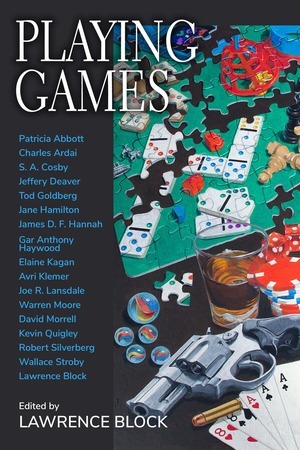 Why indeed? The three states are hardcover, paperback, and ebook. Specifically, Subterranean Press offers a deluxe signed-and-numbered limited hardcover edition for $50. I’ve published the ebook and paperback editions myself, at $9.99 and $14.99 respectively. If the cover’s not large enough on your screen to read the lineup of contributors, well, here they are in alphabetical order: Patricia Abbott, Charles Ardai, S.A. Cosby, Jeffery Deaver, Tod Goldberg, Jane Hamilton, James D.F. Hannah, Gar Anthony Haywood, Elaine Kagan, Avri Klemer, Joe R. Lansdale, Warren Moore, David Morrell, Kevin Quigley, Robert Silverberg, Wallace Stroby, and myself.
Why indeed? The three states are hardcover, paperback, and ebook. Specifically, Subterranean Press offers a deluxe signed-and-numbered limited hardcover edition for $50. I’ve published the ebook and paperback editions myself, at $9.99 and $14.99 respectively. If the cover’s not large enough on your screen to read the lineup of contributors, well, here they are in alphabetical order: Patricia Abbott, Charles Ardai, S.A. Cosby, Jeffery Deaver, Tod Goldberg, Jane Hamilton, James D.F. Hannah, Gar Anthony Haywood, Elaine Kagan, Avri Klemer, Joe R. Lansdale, Warren Moore, David Morrell, Kevin Quigley, Robert Silverberg, Wallace Stroby, and myself.
Wouldn’t alphabetical order put you third on the list? Why are you all the way at the end?
False modesty, a character defect which won’t prevent me from quoting Publishers Weekly’s starred review:
“One of the most impressive of the 17 crime stories involving games in this stellar anthology from MWA Grand Master Block (In Sunlight or in Shadow: Stories Inspired by the Paintings of Edward Hopper) is Block’s own ‘Strangers on a Handball Court.’ It riffs on Patricia Highsmith’s Strangers on a Train, as the title suggests, and provides a wholly fair plot with a gut-wrenching surprise. Even knowing that multiple twists are coming doesn’t negate their impact in Jeffery Deaver’s devious ‘The Babysitter,’ which opens with a classic trope: the innocent everyperson who stumbles on a deadly secret. When the charges of 17-year-old Kelli Lambert get bored playing Candy Land, Kelli’s search for another board game leads her into peril after the parents of the kids she’s watching suspect she’s spotted their secret plans to torch a casino so they can establish their own casino. David Morrell shines with the subtle and creepy ‘The Puzzle Master,’ in which a couple become addicted to jigsaw puzzles by a particular artist, only to find potentially ominous clues linking disparate bucolic scenes.”
That’s funny—you left out the last line. Ah, here it is: “The wide range of stories and games in them begs for a sequel.”
Huh. Let’s move right along, shall we? A few years back, I developed the Classic Crime Library as a way to bring together my early non-series  crime novels, packaging them uniformly with covers that highlight some of their earlier incarnations. Stand-alone novels, especially early titles, tend to get lost in the shuffle, and CCL packaging makes it easier for readers to find them.
crime novels, packaging them uniformly with covers that highlight some of their earlier incarnations. Stand-alone novels, especially early titles, tend to get lost in the shuffle, and CCL packaging makes it easier for readers to find them.
And collect them, because they look so nice together. And now you’re trying them in hardcover?
Eleven of them so far—or a Thief’s Dozen, in Don Westlake’s enduring phrase. That’s enough to test the waters, and if the response is good, I suspect the rest will follow.
 Here’s what’s presently on offer:
Here’s what’s presently on offer:
After the First Death. CCL #1, and David Trevor singled it out in a recent newsletter. As he mentioned, its theme and tone have made it often regarded as a precursor to the Matthew Scudder series. It was my second hardcover book, published originally in 1969 by Macmillan.
Deadly Honeymoon. CCL #2, my first hardcover book, also from Macmillan in 1967. The basis, I must admit, of a genuinely bad film.
The Specialists. CCL #5, and I won’t go through this again, but I’ve been known to refer to it as a one-book series. A 1969 Fawcett Gold 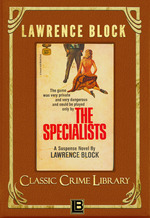 Medal paperback original, with a small-press hardcover edition brought out ages ago by James Cahill.
Medal paperback original, with a small-press hardcover edition brought out ages ago by James Cahill.
The Triumph of Evil, CCL #6. Miles Dorn, a world-weary Central European assassin, is enlisted to facilitate a political coup in the US. First published in 1971 in hardcover by World Publishing Company under the pen name Paul Kavanagh.
Such Men Are Dangerous. CCL #7, the first of three Paul Kavanagh books. In this case PK was the name on the cover and also that of of the first-person protagonist. Macmillan published the book in hardcover in 1969; two years later Mr. Kavanagh and I followed along when our editor, Jim Wade, moved over to World.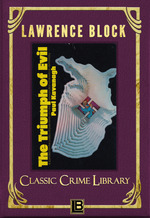
And, finally, the third Kavanagh title: Not Comin’ Home to You, CCL #8, fiction inspired by the Starkweather-Fugate murder spree. Published in hardcover by Putnam in 1974.
You Could Call It Murder, CCL #12. The assignment came via the Scott Meredith agency. Could I write a tie-in novel for Belmont Books based on Markham, a TV series starring Ray Milland? I could and did, but I felt what I’d written deserved better treatment, and my agent sent it to Knox Burger at Fawcett Gold Medal, whence it emerged as what would become CCL #13. But that meant I still owed Belmont a Book, and this is the one they got. They published it in 1961 as Markham: The Case of the Pornographic Photos. Ray Milland’s series, alas, had already been 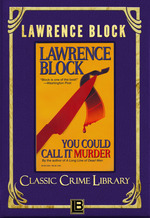 canceled by then. I changed the title when Lou Kannenstine at Countryman Press reprinted it in 1986. Aside from a long-ago large print edition, I believe the new CCL printing is the book’s first appearance in hardcover.
canceled by then. I changed the title when Lou Kannenstine at Countryman Press reprinted it in 1986. Aside from a long-ago large print edition, I believe the new CCL printing is the book’s first appearance in hardcover.
Coward’s Kiss, CCL #13. For Gold Medal, I changed the protagonist’s name from Roy Markham to Ed London, and someone there came up with Death Pulls a Doublecross for a title. I restored my own title for various paperback reprints, and a 1999 hardcover edition published by Five Star. I never managed a second novel about Ed London, but it was not for lack of trying. Later this year, Men’s Adventure Library will be publishing a collection of stories and articles of mine that ran in male adventure 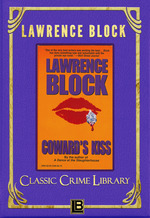 magazines over a half-century ago, and the handsome volume will include three longish stories—novelettes, I suppose—that I wrote about Ed London.
magazines over a half-century ago, and the handsome volume will include three longish stories—novelettes, I suppose—that I wrote about Ed London.
Cinderella Sims, CCL #14. This book started out as a crime novel with a counterfeiting background, and somewhere in the course of writing it I decided it wasn’t working and finished it up as an erotic novel from Nightstand Books, who published it as $20 Lust by Andrew Shaw in 1961; then a dozen years later they repackaged it as Cinderella Sims. Ed Gorman, the Sage of Cedar Rapids, championed the book, forever urging me to allow Bill Schafer at Subterranean Press to reprint it. I gave in, and it came out as a handsome hardcover book in 2003. When the time came, I tucked it into the Classic Crime Library.
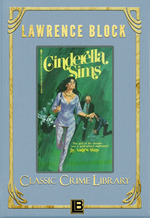 Passport to Peril, CCL #15. Lancer wanted a work of romantic suspense with an espionage slant, all in the tradition of Helen MacInnes. I made the heroine an American folksinger, set the book in the west of Ireland, and produced my only book so far as Anne Campbell Clark. Lancer published it as a paperback original in 1967, and I don’t believe it ever appeared anywhere else prior to its inclusion in the Classic Crime Library. This is its first hardcover edition.
Passport to Peril, CCL #15. Lancer wanted a work of romantic suspense with an espionage slant, all in the tradition of Helen MacInnes. I made the heroine an American folksinger, set the book in the west of Ireland, and produced my only book so far as Anne Campbell Clark. Lancer published it as a paperback original in 1967, and I don’t believe it ever appeared anywhere else prior to its inclusion in the Classic Crime Library. This is its first hardcover edition.
Ariel, CCL #16. I wrote this story of an adoption gone wrong at the behest of Herb Katz of M. Evans and Co. This was in 1975, and I was going through a bad patch at the time, and when I started work on the book I set it in Charleston, where I was holing up for a few weeks. My roots go deep in Charleston, and a major thoroughfare, Sam Rittenberg Boulevard, is named for a great-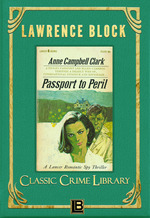 great-uncle of mine. At the time, however, I was living in a rooming house for twenty dollars a week, and wondering how long I could afford it.
great-uncle of mine. At the time, however, I was living in a rooming house for twenty dollars a week, and wondering how long I could afford it.
Never mind. I finished it, though I’d moved on from Charleston by then, and Herb Katz turned it down, and a couple of years later a new agent showed it to Donald I. Fine at Arbor House, who published it in hardcover and made a nice deal for paperback rights. Over the years, Don Fine hoped I would write another book like Ariel, but I never could. The genre it best fits is probably horror, although I don’t suppose it’s particularly likely to induce either palpitations or nausea.
Whew. I went on longer than I planned. Sorry about that.
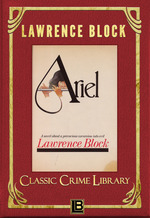 Not a problem. Parts of it were interesting.
Not a problem. Parts of it were interesting.
That’s a comfort. This probably won’t be, but all the same I probably ought to describe the CCL hardcover editions. Like our hardcover Jill Emerson titles, they’re what are called Case Laminate editions, also often referred to as Library Bindings. Instead of removable (and fragile) dust jackets, each has the cover art printed on the hardbound book itself. They’re at once attractive and durable—which I suspect is what makes them a favorite of librarians.
Speaking of librarians, could you tell us more about the Men’s Adventure Library?
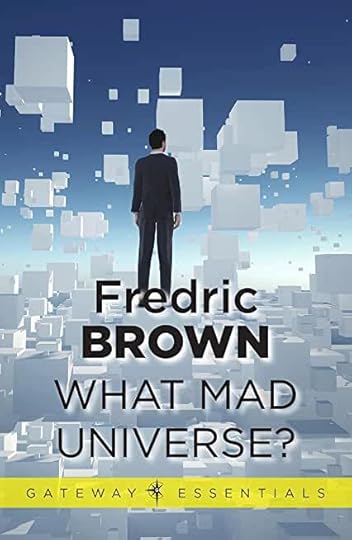 When the time comes. Believe me, y’all will get ample notice. But I want to wrap this up, and first I have to deliver the Fredric Brown tidbit I promised earlier. So why don’t I just show you the email I received last month from Marilyn Schapiro?
When the time comes. Believe me, y’all will get ample notice. But I want to wrap this up, and first I have to deliver the Fredric Brown tidbit I promised earlier. So why don’t I just show you the email I received last month from Marilyn Schapiro?
“I very much enjoyed Bernie’s latest adventure in a parallel universe. Ihave long been an SF fan as well as a detective fiction (especially
Lawrence Block) addict. Thank you for introducing me to Fredric Brown and What Mad Universe, but I wonder if you can clear up this question for me: in WMU Fredric Brown refers several times to Kennedy airport and/or spaceport.
“It seems he wrote the novel and first published it in 1949. The major
New York airport known as Idlewild opened in 1948. It was not renamed for JFK until after the 1963 assassination, at least in our universe as we know it.
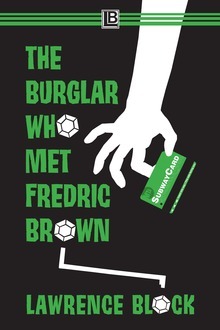 “Did FB (or Bantam Books) revise this point in the novel after 1963? Or did he temporarily slip into a different universe involving a different Kennedy or what?”
“Did FB (or Bantam Books) revise this point in the novel after 1963? Or did he temporarily slip into a different universe involving a different Kennedy or what?”
I checked the copy on my Kindle, and the airport is given throughout as Idlewild. So I can only conclude that some curiously dim editor at Bantam, readying the book for a later printing, decided that the name Idlewild was obsolete and that of course everyone knew the airport as JFK. And evidently some wiser soul changed it back some years further down the line.
But that such a glitch should occur in a book that presupposes an infinity of parallel universes strikes me as singularly appropriate. And isn’t it even sweeter that the whole business should surface now, in response to my own homage to Fredric Brown?
Cheers,

PS: As always, please feel free to forward this to anyone you think might find it of interest. And, if you yourself have received the newsletter from a friend and would like your own subscription, that’s easily arranged; an email to lawbloc@gmail.com —with LB’s Newsletter in the subject line—will get the job done.
LB’s Blog and Website
LB’s Facebook Page
Twitter: @LawrenceBlock
January 5, 2023
Brand New Year! Brand New Sletter!
David Trevor here, charged with composing LB’s first newsletter of 2023, and I may have made a mistake already in that header. I’ll leave it and hope it looks intentional, like those carpet weavers. Because only LB is perfect, right? And it’s not like I asked for this task in the first place.
Except I sort of did. I said that people were often inclined to celebrate having survived the holidays by looking for something to read, and that he’d often grumbled about the tendency of so many readers to lock onto his series characters and pass up some of his best work. I said he’d brought it on himself by writing more books than anyone could keep track of. (When Terry Zobeck was compiling his bibliography, A Trawl Among the Shelves, LB wanted him to call it The Man Who Wrote Too Much.)
Long story short, what I suggested was a newsletter pointing out some non-series books readers might otherwise overlook. “Great idea,” he said, surprising me, and then he surprised me again. “You do it,” he said.
Really? I asked which books to feature and he told me it was my call. He was busy, he was working, he didn’t want to think about it, but it was a terrific idea and I should get right to it. Just pick three or four books, find something nice to say about them, show their covers, and include links in case someone actually wants to buy something. And wind up with mentions of Playing Games and the new Burglar book, because what could it hurt?
There was a time a while back when he referred to me, I think in a newsletter, as “the indispensable David Trevor.” That’s a lovely modifier, “indispensable,” and I hope what follows won’t move him to drop the first syllable.
So here goes.
1. The Girl with the Deep Blue Eyes is an easy choice to lead off with, as it’s a personal favorite of mine. Hero is Doak Miller, a New York cop who retires under a cloud and winds up a private eye and fixer in a 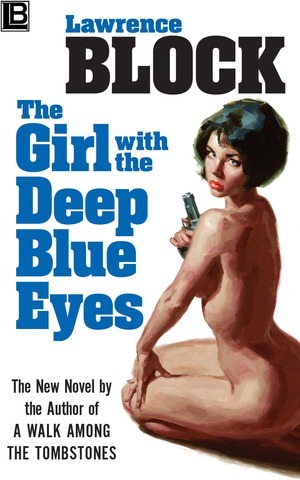 small town in central Florida. Then a job he does for the local sheriff introduces him to what LB would call the titular heroine, a married woman with a past as shady as his own. And you can take it from there.
small town in central Florida. Then a job he does for the local sheriff introduces him to what LB would call the titular heroine, a married woman with a past as shady as his own. And you can take it from there.
The book has all the drive and energy of the crime novels LB was writing for Gold Medal half a century ago, plus the depth and literary skill he developed since then. It’s sold well for Hard Case Crime, but not as well as I’d expect. The title echoes one of those early books, The Girl with the Long Green Heart, and people naturally assume it’s of the same vintage—though it was written in 2014 and published a year later. (LB’s working title was Doak Miller, he thought it would lead to people taking the book more seriously, and I think he may have been right. But that’s no title to stick on a Hard Case thriller.)
Note, too, that The Girl with the Deep Blue Eyes is intensely and specifically erotic, in a way no 1960s Gold Medal novel ever dreamed of being. And that Doak is not a very nice man—although you may well find yourself rooting for him.
2. LB has said that it was a longstanding ambition of his to write a big multiple-viewpoint novel of New York City. Before he knew anything about the book, he had a title for it, drawn from an observation of John 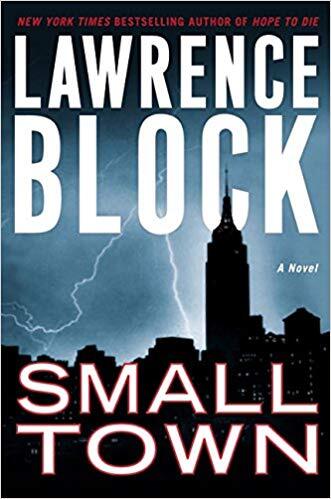 Gunther’s. He began work on Small Town in the spring of 2001, and he was around a hundred pages into it when the Twin Towers came down and the world—and especially the city—changed forever. He put his work in progress—well, no longer in progress— in a desk drawer and tried to forget about it.
Gunther’s. He began work on Small Town in the spring of 2001, and he was around a hundred pages into it when the Twin Towers came down and the world—and especially the city—changed forever. He put his work in progress—well, no longer in progress— in a desk drawer and tried to forget about it.
Then, several months down the line, he looked at what he’d written and saw a way to do it, changing its setting from a pre-9/11 New York to that same city in the ashes of the event. A whole new story emerged, and he got it all down.
HarperCollins published Small Town, and did quite well with it. But readers who have come recently to LB’s work are apt to overlook it. Some may be put off by the idea of a 9/11 novel, and it’s not that, not really. It’s a post-9/11 novel, even as its New York is a post-9/11 city.
I do know that LB got more angry reader email for Small Town than for anything he’s written before or since. The book is, um, sexually explicit, and readers who were hoping for a bubbly book about a gentleman burglar and his stub-tailed cat evidently felt betrayed. (I’ve been meaning to ask him if the memory of the book’s reception is what led him to hang the subtitle “A Novel of Sex and Violence” on Getting Off. Not that it did much good. There are one-star Amazon reviews complaining about the sex and violence in Getting Off. Like, what did they expect?)
3. LB wrote Random Walk in the summer of 1987 in the course of his first stay at a writers colony, the Virginia Center for the Creative Arts. As they once said of a Red Sox pitcher, LB wrote this “like a man with 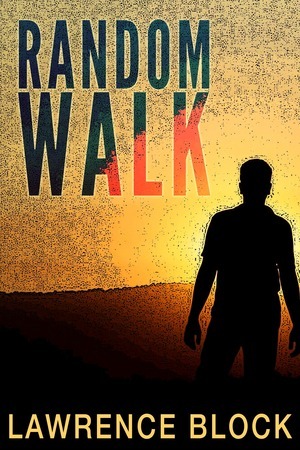 his hair on fire.” He settled in with only a vague idea of what he was going to write, and every morning he woke up knowing what he would write that day, and before four weeks were up he had a book. He insists it wasn’t really like taking down celestial dictation, but Random Walk was clearly a book that wanted to be written.
his hair on fire.” He settled in with only a vague idea of what he was going to write, and every morning he woke up knowing what he would write that day, and before four weeks were up he had a book. He insists it wasn’t really like taking down celestial dictation, but Random Walk was clearly a book that wanted to be written.
But, he says, it didn’t much want to be read. Tor published it and packaged it like science fiction, and sales were awful; of the people who read it, some loved it and the rest didn’t know what to make of it. Which is understandable, as it’s an odd book. Briefly, one man walks away from his bartending job in Oregon and starts walking east over the Cascades. And people join in, for no apparent reason, and the group begins to generate its own energy, and Remarkable Things Happen. Meanwhile, a real estate guy in Kansas kills a woman by accident and finds out to his surprise that he loves it, and can’t wait to do it again. And keeps on doing it, and keeps on loving it.
And so on. What he’s doing in the same novel with the others is just one of the book’s imponderable elements. There are people who claim to re-read Random Walk annually and swear it’s changed their lives; there are others who figure LB must have been on drugs (he wasn’t) or out of his mind (always a possibility). I’m an ardent fan myself, but your mileage may vary.
4. The Classic Crime Library is a vehicle LB dreamed up to highlight his backlist crime novels. I think it runs to twenty titles at this point, and we’ve packaged them with their early covers as an inset. I could 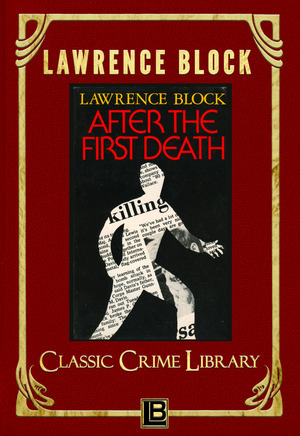 with a clear conscience recommend them all (“Collect the complete set! Win valuable prizes!”) but what I’ll do here is call the attention of Matthew Scudder fans to LB’s second hardcover book, After the First Death. (The first, also published originally by Macmillan, was Deadly Honeymoon.)
with a clear conscience recommend them all (“Collect the complete set! Win valuable prizes!”) but what I’ll do here is call the attention of Matthew Scudder fans to LB’s second hardcover book, After the First Death. (The first, also published originally by Macmillan, was Deadly Honeymoon.)
After the First Death has a hell of a first chapter. The hero wakes up in a hotel room with a killer hangover and no memory of how he got there. He was in Times Square, he was drinking, he picked up a working girl—and that’s all he remembers. Then he looks around, and there’s the girl, and she’s dead. And he says to himself, Oh, rats (or words to that effect) I’ve done it again. Because he’d killed a girl in a blackout some years back, and went to prison for it, and got out on a Miranda-type decision, and OMG what does he do now?
But a bit of memory or false memory surfaces, enough to convince him that he didn’t kill this girl, that someone else did it and framed him for it. And if that’s so, the same person must have framed him for the earlier killing—and the only way he can establish any of this is to stay away from the cops long enough to solve the crime himself.
The milieu is very much Scudder’s world, and neither the dark view or the focus on alcoholism will be unfamiliar to Scudder fans. Incidentally, if the opening seems to remind you of a Jane Fonda picture, the one you’re thinking of is The Morning After, and it came out in 1986. LB borrowed a time machine so that he could steal the idea back in 1969.
5. If you’re primarily a reader of LB’s series, well, you’re not alone. As a reader, he’d always welcomed the idea of being able to renew his acquaintance with an appealing character, and when he started writing 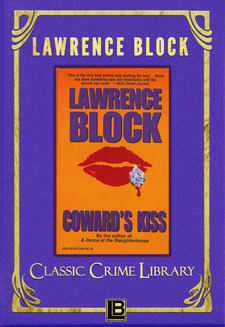 crime fiction he knew he’d want to develop series of his own. While he never wrote a second novel about Ed London, detective hero of Coward’s Kiss, he did feature the fellow in three novelettes; you can find them collected, along with his earliest pulp stories, in One-Night Stands and Lost Weekends. And he even ended Deadly Honeymoon so as to leave open the possibility of a sequel, and I think we can all be grateful he never followed through. (Not that there’s anything wrong with Deadly Honeymoon, except for the lousy movie they made from it, but no one who read that book ever clamored for an encore.)
crime fiction he knew he’d want to develop series of his own. While he never wrote a second novel about Ed London, detective hero of Coward’s Kiss, he did feature the fellow in three novelettes; you can find them collected, along with his earliest pulp stories, in One-Night Stands and Lost Weekends. And he even ended Deadly Honeymoon so as to leave open the possibility of a sequel, and I think we can all be grateful he never followed through. (Not that there’s anything wrong with Deadly Honeymoon, except for the lousy movie they made from it, but no one who read that book ever clamored for an encore.)
So what series did he write? Well, the first two you’ll think of are probably Matthew Scudder and Bernie Rhodenbarr, followed closely by Keller. And then there’s Evan Tanner, LB’s first series character,  and Chip Harrison. Matthew Scudder was conceived as a series protagonist, and LB knew he was going to write at least three books before he started work on the first, The Sins of the Fathers. Each of the others developed into a series when LB finished the first book and found he had more to say about the character. (Keller started as a single short story, “Answers to Soldier,” and a couple of years passed before he showed up again in “Keller’s Therapy.”)
and Chip Harrison. Matthew Scudder was conceived as a series protagonist, and LB knew he was going to write at least three books before he started work on the first, The Sins of the Fathers. Each of the others developed into a series when LB finished the first book and found he had more to say about the character. (Keller started as a single short story, “Answers to Soldier,” and a couple of years passed before he showed up again in “Keller’s Therapy.”)
But how many books does it take to make a series? Could you have a series with only a single book? Let me answer that by recommending the series character Martin H. Ehrengraf. (The H stands for either Herod, like the king in the Bible, or Harrod, like the department store. Hard to say which.)
Ehrengraf is a criminal defense attorney who never loses a case, and in fact never seems to try one; somehow his clients always turn out to be 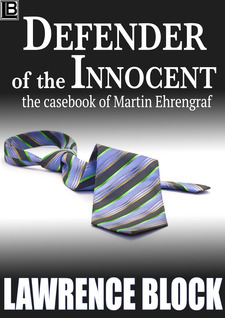 innocent—but it’s not hard to see that the dapper little man earns his high fees. There have been twelve Ehrengraf stories ever since Ellery Queen ran the first one in 1978. You can find them all in a single volume, Defender of the Innocent. There’ll never be an Ehrengraf novel, and I’d be surprised if there are any more stories to be written. The premise is kind of one-trick-pony, and I think it’s remarkable LB managed to make it work a dozen times.
innocent—but it’s not hard to see that the dapper little man earns his high fees. There have been twelve Ehrengraf stories ever since Ellery Queen ran the first one in 1978. You can find them all in a single volume, Defender of the Innocent. There’ll never be an Ehrengraf novel, and I’d be surprised if there are any more stories to be written. The premise is kind of one-trick-pony, and I think it’s remarkable LB managed to make it work a dozen times.
So that’s a series in a single volume. And I should mention (and recommend, because why not) The Specialists, which LB has specifically labeled a one-book series. He’s told the story—don’t ask me where—of how he came up with the idea of a gang of Vietnam vets and their old commanding officer, living separate lives and getting together now and then to pull a caper and right wrongs in the process. (And if this sounds like The A-Team, well, 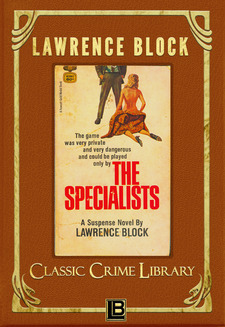 as with After the First Death vs. The Morning After, this is yet another case of LB committing arrant plagiarism via that borrowed time machine.)
as with After the First Death vs. The Morning After, this is yet another case of LB committing arrant plagiarism via that borrowed time machine.)
LB wrote The Specialists as the first volume of a series, and when his agent asked when he’d deliver the second, he said probably never. The book, he said, was very much the kind he liked to read, but it turned out it wasn’t the kind he liked to write. Huh? I’m not sure I get it either, but that’s where he left it. It’s a one-book series, and if you like it, well, don’t hold your breath waiting for a sequel.
I was going to pick out a book or two from the Collection of Classic Erotica, and one of the Jill Emerson titles as well, but I think that’s enough. More than enough? Probably.
Esp. since I’m supposed to save room to say something nice about the new anthology and the new Burglar book.
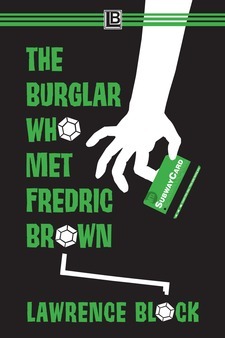 The new Bernie Rhodenbarr is very new in that LB finished writing it around the end of April, but it’s not that new in that it’s been on sale since mid-October. It’s The Burglar Who Met Fredric Brown, as you probably know, and the ebook and paperback editions are selling well and getting a lot of attention. I’d say I think it’s one of the best books in the series, but why should you care what I think? If you’re a Bernie Rhodenbarr fan you’ll want to see for yourself, and if not, well, I can’t see how my enthusiasm would make you reach for your wallet.
The new Bernie Rhodenbarr is very new in that LB finished writing it around the end of April, but it’s not that new in that it’s been on sale since mid-October. It’s The Burglar Who Met Fredric Brown, as you probably know, and the ebook and paperback editions are selling well and getting a lot of attention. I’d say I think it’s one of the best books in the series, but why should you care what I think? If you’re a Bernie Rhodenbarr fan you’ll want to see for yourself, and if not, well, I can’t see how my enthusiasm would make you reach for your wallet.
If he bothers to read that paragraph he’ll make me rewrite it.
Never mind. The anthology is Playing Games, and I took a break midway through this newsletter to upload it, so the ebook is now available for pre-order on most online platforms. The release date is 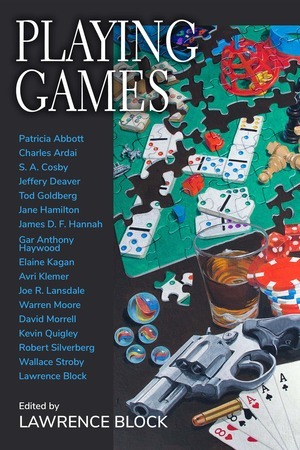 January 31, at which time the paperback will also go on sale, even as Subterranean will be shipping their limited hardcover edition. The anthology got a starred review from Publisher Weekly, which you can read at the bottom of the online book description at any of these sites: Amazon Barnes & Noble Kobo Apple Vivlio Thalia Smashwords
January 31, at which time the paperback will also go on sale, even as Subterranean will be shipping their limited hardcover edition. The anthology got a starred review from Publisher Weekly, which you can read at the bottom of the online book description at any of these sites: Amazon Barnes & Noble Kobo Apple Vivlio Thalia Smashwords
I think of Playing Games as akin to Collectibles. In both cases, LB came up with a unifying subject that sparked a lot of ideas and led to a batch of stories that managed to belong in the same book with no loss of individuality. Once again, the lineup mixes Big Names (David Morrell, Jane Hamilton, Jeffery Deaver, Joe R. Lansdale) with Rising Stars (Avri Klemer, James D. F. Hannah, Kevin Quigley). If I had to pick a favorite, it’d be “Lightning Round,” Warren Moore’s take on barroom trivia.
What else? Well, Luigi Garlaschelli came through with his translation of the fourth Scudder novel, A Stab in the Dark, and we’ve published it 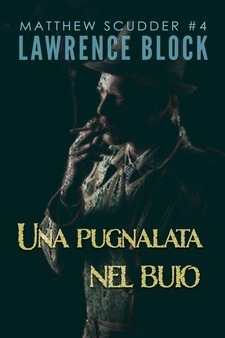 in ebook and paperback as Una Pugnalata nel Buio. (That’s not to be confused with Aspettando il Buio, Luigi’s translation of A Time to Scatter Stones. I guess “buio” is a hard word to avoid in il mondo di Scudder.)
in ebook and paperback as Una Pugnalata nel Buio. (That’s not to be confused with Aspettando il Buio, Luigi’s translation of A Time to Scatter Stones. I guess “buio” is a hard word to avoid in il mondo di Scudder.)
We may have mentioned this before, but we’ve set the release date for The Autobiography of Matthew Scudder. It’ll be on LB’s birthday, June 24. Sometime between now and then the book will be preorderable. And yes, we’ll let you know.
What else? Well, I won’t pretend the hardcover editions of the Jill Emerson novels have been setting sales records, but LB’s sufficiently encouraged by their performance—and their production quality—to plan on extending the same treatment (called Case Laminate or Library Binding) to the titles in our Classic Crime Library. Again, when they’re up and ready to go, we’ll get word to you.
And that’s more than I planned on writing. Way more, and saying so just makes it longer. So I’ll stop, and close by telling you that LB joins me in wishing you a truly wonderful year.
So I remain, indispensably yours,
David Trevor
for

PS: As always, please feel free to forward this to anyone you think might find it of interest. And, if you yourself have received the newsletter from a friend and would like your own subscription, that’s easily arranged; an email to lawbloc@gmail.com with LB’s Newsletter in the subject line will get the job done.
LB’s Blog and Website
LB’s Facebook Page
Twitter: @LawrenceBlock
December 21, 2022
LB’s New Year’s Newsletter






 O Frabjous Day!
O Frabjous Day!Callooh! Callay!
Well, hello there! It’s my great pleasure to wish all of y’all…
The joys of the season, right? Hanukkah’s underway and Christmas is waiting in the wings, with a brand-new year trailing it by just a week. So what have you got for us, LB?
Well, let’s see. A few months ago, Neil Nyren asked if I had anything good to share with Mystery Writers of America members on the topic of titles. I did, as it happened, and wrote up a recollection some forty years old. It turned up today in Neil’s “Working Titles vs. Titles That Work,” published in The Third Degree, MWA’s members-only newsletter. I thought some of y’all might find it interesting:
Around the time I delivered the sixth Matthew Scudder novel, When the Sacred Ginmill Closes, my editor at Arbor House wanted to know the title for the next one. Now I didn’t know that there would be a next one—and in fact there wouldn’t for three or four years—but Don Fine was still running Arbor House at the time, and he was worse than George Patton when it came to outrunning his own supply lines. He was always announcing forthcoming books that never forthcame. It was easier to tell him something than to explain why I couldn’t, and the Scudder titles were always five words long (which is why Ginmill is one word) so I picked out five words and told him the next book would be Like a Lamb to Slaughter.
And I guess he went ahead and listed it in his catalog, because it wasn’t too long before a monthly men’s magazine turned up with a very nice if somewhat nonspecific review for the new Scudder novel, Like a Lamb to Slaughter.
Huh?
I knew the reviewer, and learned that his publisher had this long lead time, and if he waited until books came out, or even until ARCs were available, the books might already be remaindered before anyone had read his reviews. So, on rare occasions, and only when he knew and trusted the professionalism of a particular writer, he’d go ahead and write a review of a book based on its description in the publisher’s catalog.
Okay. These things happen, and no harm no foul, and so on.
A couple more years go by. I still haven’t written that seventh Scudder novel. Now Eden Collinsworth is running things at Arbor House, and what were the prospects for a new Scudder novel?
Slim, I told her, but I did have enough short stories for a book, so could we fill in with that? Earlier they’d published Sometimes They Bite, which featured a Scudder novelette, and it had done well enough to justify a second volume. Why not bring one out, and call it Like a Lamb to Slaughter?
She was uncertain. A Scudder novel was what she really wanted. Well, I said, the collection could include a Scudder novelette, one I’d published some years back in Alfred Hitchcock’s Mystery Magazine. It was called A Candle for the Bag Lady, and it could certainly be the book’s keynote or feature or centerpiece, whatever you wanted to call it, and—
Eden sat back and thought. She repeated the novelette’s title and wondered if it would be possible to change it. Could we call the story Like a Lamb to Slaughter?
I told her that was a brilliant idea, and she said in that case we could go ahead with the collection.
“That should work perfectly,” I said. “And, just so you know—we already got a terrific review in Penthouse.”
Well, okay. That’s a story worth telling, and I guess it’s a way for you to plug an old book, but is it even around after all these years?
Like a Lamb to Slaughter was published in 1984 and is no longer in print, though copies are not terribly hard to find. But all of its contents were included in my omnibus short story collection, Enough Rope, which is readily available in print and ebook, while the Scudder novelette in question appears in The Night and the Music with its original title restored. (That’s “A Candle for the Bag Lady,” and it’s individually eVailable for Kindle as well—$2.99, or a free read for Kindle Unlimited members.)
And what else ought I to tell you?
I suppose you could brag about that bit in the Guardian.
I don’t see how I can restrain myself. Matthew Scudder got a huge helping hand from Ian Rankin, who responded as follows when the Guardian asked him to name his favorite fictional detective:
“I was a fairly late convert to crime fiction as a reader, and one of the first characters I remember falling for in a big way was Lawrence Block’s Matt Scudder. Scudder is a private eye who is an ex-cop. He’s conflicted, driven and an alcoholic. His beat is contemporary New York and his friends include a brutal yet gracious villain called Mick Ballou. I’d say that the gangland boss Cafferty in my novels owes a large debt to Ballou and (especially in his early outings) my hero John Rebus shares DNA with Scudder.
“The novels are all great, but my favourites include When the Sacred Ginmill Closes and A Walk Among the Tombstones. They are the perfect hardboiled mix of grit and poetry: cool jazz with surface noise.”
Cool jazz with surface noise. That’s right on target, isn’t it?
I’d say so. I was hugely chuffed to read this, as you might imagine, and the timing added to the impact; just days earlier I’d finished reading Sir Ian’s new Rebus novel, A Heart Full of Headstones, and at the risk of sounding all quid-pro-quo-ish, I’ll just say it’s brilliant and let it go at that.
Well, if you don’t mind, I’ll take it a step further. It is indeed brilliant in the ways we’ve come to expect, but beyond that your friend Mr. Rankin shows he’s willing to take artistic chances and paint his hero into a rather forbidding corner. As satisfying as I found this book, I’m at least that eager to see where he gets to in the next one. I hate to butt in this way, but—Quite all right. I couldn’t have said it any better myself.
Really? Okay if I use that as a blurb? “Lawrence Block: ‘I couldn’t have said it any better myself!’”
Okay, but only if you lose the exclamation point. Meanwhile, let me run through a few bits of news I want to impart before we ring down the curtain on 2022.
1. We’ve set he publication date for The Autobiography of Matthew Scudder. I’ll be bringing out the ebook and paperback editions on June 24, 2023, on which date I’ll be celebrating my 85th birthday. (The book’s subject, Mr. Scudder himself, is a somewhat younger man; he won’t reach that same milestone until September 7.)
2. I’m delighted to announce that Dreamscape will publish the audio edition of The Autobiography of Matthew Scudder; the date’s not set yet, but I expect it’ll be the same as the ebook and paperback, June 24. We’ve got some exciting ideas for the audiobook’s production, which I hope I’ll be able to recount before long.
3. I recently signed the limitation sheets for Subterranean’s deluxe hardcover edition, to consist of 600 signed-and-numbered copies and 15 signed-and-lettered copies. Subterranean hasn’t set a date yet—when they do, I’ll let you know—but you can expect a summer release.
4. Preorders: You’ll be able to preorder the ebook and paperback (and very likely the audiobook as well) during the months immediately preceding publication. I’ll let you know when we open that door, so that you can guarantee you get the book as soon as it’s out. There’ll also be a preorder period for Subterranean’s limited editions, and in their case you can add Fear Of Missing Out to the list of reasons to order early. Limited editions are so designated for a reason. Again, I’ll let you know when Subterranean is accepting preorders—or do yourself a favor and get on their mailing list. An email to info@subterraneanpress.com will get you regular announcements of all their magnificent books, my own among them; you can tell ‘em I sent you…
5. Speaking of Subterranean, they’ll be bringing out my new anthology on the last day of January. You can preorder it (and read all about it) by clicking on the title: Playing Games. Again, I’ll be self-publishing the paperback and ebook editions, with the same January 31 release date.
6. My agent is in the process of offering The Autobiography of Matthew Scudder to overseas publishers—but, as has been my usual practice in recent years, I’ll be self-publishing the book’s German and Italian editions. Sepp Leeb, whose recent translations include Dead Girl Blues and Kellers Katastrophe, is at work on the German rendition, while Luigi Garlaschelli, who has just wrapped up Scudder #4 (Una pugnalata nel buio), will make Mr. Scudder’s autobiography his next project.
7. “Block is like fine wine, he gets even better with age.” So says Vick Mickunas in the Dayton Daily News, listing The Burglar Who Met Fredric Brown among his favorite mysteries of 2022. It’s a comfort to read, esp. when I’m feeling more like vinegar than Valpolicella. I’d wondered if the book’s Parallel Universe element might alienate some readers, but y’all seem to be taking it in stride; on the plus side, Bernie and Carolyn appear to be winning new friends in the world of science fiction fandom. (Fredric Brown himself, of course, had a foot firmly planted in each of those parallel worlds.) The book is doing well in its three versions, ebook and paperback and audiobook, and there’ll be a Subterranean Press hardcover limited sometime in 2023.
You’ve been saying that a lot lately.
Oh, there you are! I was beginning to think you’d wandered off.
I figured it was impolite to interrupt.
That never stopped you in the past.
Well, you said you had a lot to report, and I figured I’d give you enough rope to, um, make your point.
Let me use a few yards of it to make a point to readers whose habit it is to obtain this newsletter via a Twitter or Facebook link. That’s fine as long as it works, but I’d like to suggest you subscribe via an email to lawbloc@gmail.com with LB’s Newsletter in the subject line. I’ve spent less and less time on Facebook of late, and feel that gap widening; as for Twitter, no one knows what that particular part of the future may hold.
It’s an uncertain world. So what does 2023 look like for you? What are you going to write next?
Ah, time will tell, won’t it? It always does. I’ll grudgingly acknowledge what seems to be undeniable: the slings and arrows of age notwithstanding, I’ll evidently go on telling myself stories as long as my waning energy and imagination allow. I’m not sure I have much genuine choice in the matter. It seems to be my lot to continue telling lies, if more for fun than for profit, for as long as I possibly can.
Let’s hope 2023 turns out to be a good year for all of us.
Cheers,

PS: As always, please feel free to forward this to anyone you think might find it of interest. And, if you yourself have received the newsletter from a friend and would like your own subscription, that’s easily arranged; an email to lawbloc@gmail.com with LB’s Newsletter in the subject line will get the job done.
LB’s Blog and Website
LB’s Facebook Page
Twitter: @LawrenceBlock











November 12, 2022
SOME SURPRISING NEWS…
Yeah, I’ll bet. “The Burglar Who Met Fredric Brown” is out, and the reviewers can’t contain their enthusiasm, and the book’s flying off the virtual shelves, and blah blah blah. And that’s your headline? Some surprising news indeed. The real surprise is you didn’t follow it with an exclamation point.
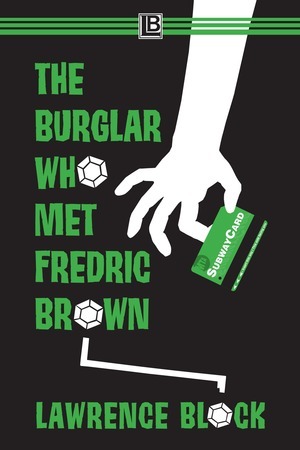 My wife talked me out of it.
My wife talked me out of it.
And you actually took her advice? I guess that’s the surprise.
Well, it surprised her. But there’s something else. I’ve written a book.
That’s a surprise? It’s a feat you’ve accomplished over 200 times. And I already mentioned the book. Bernie Rhodenbarr’s back, in a book that I’ll grant you has some surprising twists and turns, and it’s getting a lot of attention and making a lot of readers very happy, but how does that add up to a surprise? You’ve been hollering about the book since you finished it back in the spring, and it’s out, and I’d congratulate you if the very prospect didn’t stimulate my gag reflex, but—
I finished work on The Burglar Who Met Fredric Brown on April 30.
Isn’t that what I just said?
And in June I sat down at my desk and started work on a brand-new book, one I hadn’t even imagined before. And, two days before the October 18 release of The Burglar Who Met Fredric Brown, I finished it.
You’ve got to be #@%$&!! kidding. But you’re not, are you? You’re #@%$&!! serious.
And you’re #@%$&!! surprised.
Astonished, frankly. Have you looked in the mirror lately? Or at a calendar? You’re 84 years old. What gives you the right to turn out two books in a single year?
I believe it’s enshrined in the Constitution.
Yours or the nation’s? Never mind. Let me get clear on this. It’s a completely new book?
It is.
And it’s a novel?
That’s hard to say.
It’s hard to say? Evidently, since you’re having trouble saying it. But how can it be hard to say? Randall Jarrell told us that a novel is a book-length work of fiction that has something wrong with it.
Well, my book runs 65,000 words, so it’s definitely book-length. And there’sno question it’s got something wrong with it.
And it’s fiction?
Let’s say it’s a work of the imagination. I think it may clear things up a little if I tell you the title.
I’m listening.
“The Autobiography of Matthew Scudder.”
Crikey. The Autobiography—
—of Matthew Scudder. Briefly, here’s what happened. A publisher friend asked me to write a 4000-word profile of Scudder, and I found I flat-out hated the idea of writing about a character of mine. If anyone was going to tell you about Matthew Scudder, it ought to be the man himself.
Okay.
So suppose you could say I turned it over to Scudder. He’s literate, he’s insightful—we know that from the novels. Suppose he sat down at his computer to write the story of his life. What would he come up with?
And what do you do? Recap the books?
Why would I want to do that? And why would anybody want to read it? No, this is Matt telling the rest of the story, starting with his birth in September of 1938. (And one of the first things we learn is that the novels got the date wrong by around six months.)
So you’ve written the autobiography of a fictional character who’s already been the protagonist and first-person narrator of a whole series of novels.
Right, and they’re novels, styled and crafted to be effective fiction. What we’ve got here, on the other hand, is the hero of those novels sitting down to spell out the actual story of his life.
Has anyone ever done this sort of thing before?
Probably.
It sounds kind of PoMo, doesn’t it?
Huh?
You know. Postmodern.
I’m not sure I know what that means.
Or meta. Maybe that’s the word I want.
Well, I definitely don’t know what that one means.
Nobody does. The one thing I know is that this is something I have to read. When will I be able to do that?
Thanks to the miracle of self-publishing, you won’t have all that long to wait. It’s my plan to release the ebook and paperback editions of The Autobiography of Matthew Scudder sometime in May or June of 2023.
You could do it on your birthday. You seem to like to bring out books on your birthday. Isn’t that what you did with Dead Girl Blues and A Writer Prepares?
Good point. That would be June 24, 2023.
The very day you turn 85. And a scant three months before Matt celebrates that same birthday.
Two months and two weeks, actually. His birthday’s September 7.
Well, do it on your birthday, okay? I don’t want to wait any longer than I have to. Will there be a hardcover?
Indeed there will, a signed-and-numbered limited edition from Subterranean Press—and a super-deluxe lettered edition as well.
If only. What else can you tell me?
Not much. I’ve had readings from some trusted friends, and they all absolutely loved the book—but they’re hard-core Scudder fans, and a long way from being an impartial audience. My wife and daughters were my first readers, and my wife paid me the greatest compliment I can recall. She said she kept having to remind herself that what she was reading was fiction.
Wow.
On the other hand, I can’t imagine anybody who’s not an ardent Scudder enthusiast having any interest at all in the new book. “The life story of some made-up character I never heard of? You gotta be kidding.” So this is by no means a book with the word “bestseller” all over it like brown on rice.
As opposed to the new Burglar book.
Yes, The Burglar Who Met Fredric Brown is getting a heartening reception. Instead of scaring off readers, the parallel universe element seems to have energized the series, managing to make the new book different while keeping it very much the same as its fellows. It’s Bernie and Carolyn, both of them doing what they do best—and readers are responding even better than I’d hoped.
And why not? It’s the best of all possible worlds, right? Isn’t that the line you came up with?
I think Voltaire may have come up with it first. But never mind. Bernie’s knocking it out of the park, and Matt’s in the on-deck circle, and I have to say I’m feeling pretty good.
And what are you gonna do for an encore?
I’ll pretend I didn’t hear that. And you know what? I’m outta here. Enjoy the change of seasons, y’all. Fall has largely fallen, and winter’s waiting in the wings, so stay warm, stay dry, and find a good book to keep you company. And if it’s one I wrote, so much the better.
Cheers,

PS: As always, please feel free to forward this to anyone you think might find it of interest. And, if you yourself have received the newsletter from a friend and would like your own subscription, that’s easily arranged; an email to lawbloc@gmail.com with LB’s Newsletter in the subject line will get the job done.
October 14, 2022
Leave the door open—
Hi there. I’ve a few things to tell you, and no end of other things I ought to be doing, so why don’t we Get Right To It. (And, to lend this missive the illusion of order and structure, I’ll number the items.)
1. The Burglar Who Met Fredric Brown, the thirteenth Bernie Rhodenbarr book and the first novel since The Burglar Who Counted the Spoons in 2013, is scheduled for ebook and paperback publication on Tuesday, 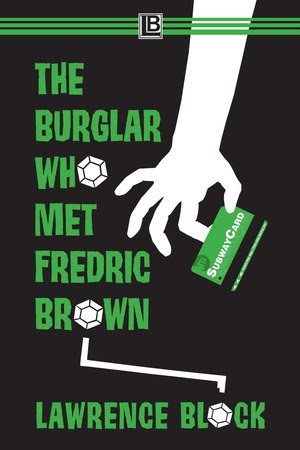 October 18. If you act quickly, you can still preorder the book from Amazon Barnes & Noble Kobo Apple Thalia Vivlio
October 18. If you act quickly, you can still preorder the book from Amazon Barnes & Noble Kobo Apple Thalia Vivlio
And why preorder? Well, doing so locks in the preorder price—$9.99 for the ebook, $17.99 for the paperback. (I don’t anticipate an increase in the ebook price, but one never knows. The paperback, on the other hand, is set to increase immediately upon publication to $19.99.)
Preordering also gives you one less thing to remember. A couple of mouse clicks and you’re sure to be one of the first to have Bernie’s latest adventure in your hands or on your eReader. There’s no risk that you‘ll wake up one morning in January, on the third day of a Caribbean cruise, wondering whatever happened to that book you meant to order. Something about a burglar, wasn’t it? And when will it come out? Oh, it already did? Rats. Sheesh, how’s I miss it?
And I know whereof I speak. The other day a package arrived, and I opened it to find Righteous Prey, John Sandford’s new novel. I’d completely forgotten about the book, and if there was a publicity blitz in recent weeks it managed to miss me completely. But months ago I’d preordered the book, and here it was. (And—no surprise here—it’s outstanding. Moreover, my aging memory being what it is, in a few months I’ll be able to read it again for the first time.)
So—preorder The Burglar Who Met Fredric Brown. It’s already getting heartening reviews, and so far this week I’ve taped a pair of radio interviews, one with Vick Mickunas for WYSO and another with Chris Buckler for the Northern Ireland section of the BBC. (Both interviewers were well prepared and a pleasure to chat with—no surprise there; if you can, you may want to catch one or both.)
Or, if preordering feels too much like getting out in front of your skis, or a show of faith in a future you’re not all that certain of, well, go ahead and tie a string on your finger, and order the ebook or paperback on Tuesday. The same links will work, but I’ll run them again here, just to save you from having to scroll up: Amazon Barnes & Noble Kobo Apple Thalia Vivlio
2. For a while I’d thought I might go all pre-pandemic and schedule one or more in-store signing session, but that’s not gonna happen. But there’s a good and easy way for you to obtain autographed copies of The Burglar Who Met Fredric Brown. Just click on this link for The Mysterious Bookshop; they’re taking orders for the book, and another couple of clicks will guarantee you a signed copy. (I’ll also be able to inscribe copies to order, if that’s your preference, but toward that end you might want to call the store at (212) 587-1011 and let them know exactly what you want. They also have an extensive selection of my other books, including some elusive early first editions, should you have some gaps on your LB shelf that you’re eager to fill.)
 3. My latest anthology, Playing Games, has been a long time in the works. Subterranean Press is publishing a deluxe signed-and-numbered hardcover edition, limited to 750 copies, and they’re now able to accept preorders in advance of publication in January. You can view the full table of contents on the preorder page; the lineup of authors is impressive, and the stories they’ve produced are genuinely outstanding, if I say so myself.
3. My latest anthology, Playing Games, has been a long time in the works. Subterranean Press is publishing a deluxe signed-and-numbered hardcover edition, limited to 750 copies, and they’re now able to accept preorders in advance of publication in January. You can view the full table of contents on the preorder page; the lineup of authors is impressive, and the stories they’ve produced are genuinely outstanding, if I say so myself.
But, happily, I don’t have to say so myself. Publishers Weekly has been good enough to say so, in a starred review, which I’ll quote in full, because why not?
“One of the most impressive of the 17 crime stories involving games in this stellar anthology from MWA Grand Master Block (In Sunlight or in Shadow: Stories Inspired by the Paintings of Edward Hopper) is Block’s own “Strangers on a Handball Court.” It riffs on Patricia Highsmith’s Strangers on a Train, as the title suggests, and provides a wholly fair plot with a gut-wrenching surprise. Even knowing that multiple twists are coming doesn’t negate their impact in Jeffery Deaver’s devious “The Babysitter,” which opens with a classic trope: the innocent everyperson who stumbles on a deadly secret. When the charges of 17-year-old Kelli Lambert get bored playing Candy Land, Kelli’s search for another board game leads her into peril after the parents of the kids she’s watching suspect she’s spotted their secret plans to torch a casino so they can establish their own casino. David Morrell shines with the subtle and creepy “The Puzzle Master,” in which a couple become addicted to jigsaw puzzles by a particular artist, only to find potentially ominous clues linking disparate bucolic scenes. The wide range of stories and games in them begs for a sequel.”
I don’t know about a sequel. I think I may be done with practicing anthologism without a license. But I’ve said that sort of thing before, haven’t I? Meanwhile, I should add, I’ll be self-publishing Playing Games in ebook and paperback editions, but not for a while, as I’m too busy by half these days. My editions should be available relatively early in 2023, and as soon as I know more I’ll pass the word.
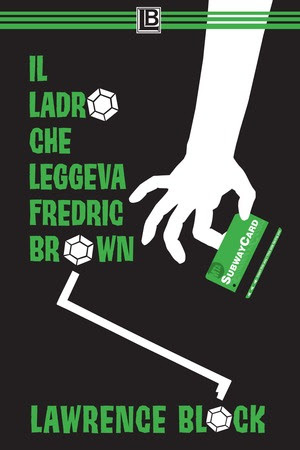 4. I may have mentioned earlier that Luigi Garlaschelli and Stefan Mommertz were at work on translating The Burglar Who Met Fredric Brown into Italian and German respectively. I can now proclaim that Luigi’s rendition, Il Ladro che Leggeva Fredric Brown, is preorderable as an ebook right now at Amazon Barnes & Noble Kobo Apple Thalia Vivlio, and will be officially released in both ebook and paperback on October 18, and Jeff Wong has furnished an Italian version of his terrific cover. The German version won’t be too far behind; rest assured I’ll let you know when it’s available.
4. I may have mentioned earlier that Luigi Garlaschelli and Stefan Mommertz were at work on translating The Burglar Who Met Fredric Brown into Italian and German respectively. I can now proclaim that Luigi’s rendition, Il Ladro che Leggeva Fredric Brown, is preorderable as an ebook right now at Amazon Barnes & Noble Kobo Apple Thalia Vivlio, and will be officially released in both ebook and paperback on October 18, and Jeff Wong has furnished an Italian version of his terrific cover. The German version won’t be too far behind; rest assured I’ll let you know when it’s available.
5. I may have mentioned this before, but that’s no reason not to do so again: Subterranean will be publishing two limited hardcover editions of The Burglar Who Met Fredric Brown, a 750-copy signed-and-numbered edition, and a high-ticket lettered edition limited to 15 (!) copies and bound, I shouldn’t wonder, in the skin of unborn unicorns. These won’t be out until sometime in 2023, probably in the spring, but I’ve done my part toward that end by signing the limitation sheets. Further details when I have them.
6. It’s no spoiler to tell you that the notion of parallel universes plays a key role in The Burglar Who Met Fredric Brown. (I’ve given a taste thereof in book description on the Amazon page.) That concept is more a staple in science fiction, and the book’s already getting some attention in that world. (Or should that be worlds? Never mind.) Here are some examples:
“Lawrence Block tells a breezy, humorous tale of crime and a changing world that is at once wistful and clear-eyed. In the fragmented America of 2022, where people on both sides of the political spectrum find themselves wishing that things could return to the way they once were, it is delightful to read a well-told tale of what happens to two lovable characters when some of the things that they found themselves missing suddenly reappear in what seems to be a parallel universe.” —Jack Seabrook, Bare-Bones E-Zine
“Block doubles the stakes by taking as his source material one of the first science fiction novels to also be a commentary on science fiction: Frederic Brown’s What Mad Universe? In Brown’s novel, science fiction editor Keith Winton finds himself in an alternate universe constructed from his fantasies about what Science Fiction should be. Similarly, Bernie Rhodenbarr finds himself in a universe that has changed many of the things that have taken the joy out of his career as a thief and bookseller. Amazon no longer exists. Neither do security cameras. An old friend is miraculously restored to life. Is this really the best of all possible worlds?” —Erica Obey, What I’m Reading at Byrdcliffe
7. Oh, hell. I’ve gone and done it, I’ve unwittingly buried the lede! I’d written all the foregoing when this popped into my Gmail-box, the latest column by Michael Dirda, the Pulitzer Prize-winning critic for the Washington Post:
“I generally take the bus to New York but this time managed to find a reasonably priced ticket on Amtrak. As usual, I waffled for an hour over what to read en route, finally settling on Lawrence Block’s just-published The Burglar Who Met Fredric Brown, an unexpected but welcome late outing for Bernie Rhodenbarr, antiquarian bookseller, genial first-person narrator and professional thief.
“I was only halfway through Block’s novel — at 84, this beguiling storyteller has lost none of his flair — when my train rolled into Penn Station. Consequently, I had to break off just after Bernie and his lesbian friend Carolyn had stolen the Kloppmann Diamond from the Trump Tower-like penthouse of a sleazy billionaire. What about all the high-tech surveillance cameras, you ask? Block solves this problem with a bold science-fictional twist you should discover for yourself.”
Whew. I’ll end this now and get it off to y’all. At 84, this beguiling storyteller has almost certainly Forgotten Something Important, but his chance of remembering it is slim at best. I’m way too rushed, and I wouldn’t be surprised if this newsletter is awash in typographical errors and broken links, but at this hour it’s more important that it be done than it be done perfectly.
So here you have it.
Cheers,

PS: As always, please feel free to forward this to anyone you think might find it of interest. And, if you yourself have received the newsletter from a friend and would like your own subscription, that’s easily arranged; an email to lawbloc@gmail.com with LB’s Newsletter in the subject line will get the job done.
LB’s Blog and Website
LB’s Facebook Page
Twitter: @LawrenceBlock
September 27, 2022
This is embarrassing…
On September 4, some 23 days ago as I write this, Peter Straub died. He was a good friend for thirty years or more, and I felt the loss deeply, along with regret that we’d largely lost touch in recent years.
In the wake of his death, a Talkwalker email alert steered me to a website sporting brief extracts of a batch of critical essays Peter had written, one of them having to do with my own Matthew Scudder series. None of it rang any bell whatsoever. When had Peter written about Scudder? Where might his words have appeared?
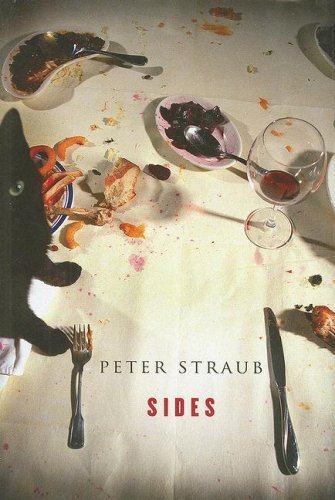 It wasn’t hard to learn that what he’d written was “Hope to Die: An Appreciation of the Scudder Series,” and that it was included in Sides, a collection of Peter’s nonfiction published by an esteemed small press, Cemetery Dance. I ordered the book, but by the time it arrived the origin of the piece had already dawned on me.
It wasn’t hard to learn that what he’d written was “Hope to Die: An Appreciation of the Scudder Series,” and that it was included in Sides, a collection of Peter’s nonfiction published by an esteemed small press, Cemetery Dance. I ordered the book, but by the time it arrived the origin of the piece had already dawned on me.
In 1994, William Morrow had published Hope to Die, the fifteenth Matthew Scudder novel. Sometime after the book appeared, Michael Johnson of Scorpion Press, asked if he might publish a deluxe edition of 100 copies, and if I could suggest someone who might be persuaded to contribute an introduction. I agreed, as who would not, and suggested Peter Straub might be induced to say a few words.
And then I largely forgot about the whole enterprise. Months later I received my complimentary one or two copies of the book, but I don’t think I did anything with it but note its very attractive binding before finding a home for it on the appropriate shelf.
I never read Peter’s contribution. By the time I got the book, I may or may not have been mindful that he’d signed on to introduce it; if I was, I likely assumed it was the usual page or two of blather, telling the reader that he or she was in for a treat. I have, over the years, written many such introductions, and few if any are worth the time it would take you to read them.
So I never read it, and never said a word about it to Peter—who certainly never inquired.
When I realized all of this, I could have looked for that Scorpion Press edition. I’m pretty sure I know where it is. I decided to wait for Sides to arrive, and it did, and I saw at once that Peter’s introduction was neither brief nor perfunctory, that in fact it ran to 22 pages. I read a few pages, and that was enough to make it clear that this was far and away the most perceptive and insightful view of my work ever recorded.
And then I had to stop. Out of what, exactly? Guilt? Embarrassment? False modesty? I don’t know. I’ve always had a problem with being the center of favorable attention; fortunately it’s something that doesn’t arise very often.
I turned it over to my wife, who informed me after reading it that Peter’s words were indeed quite wonderful, and that I would really have to read them myself. And last night I did, and my initial impression was confirmed, and then some.
I feel conflicted about recommending Peter’s essay to you, but how can I not? I’ve read some of Sides’s other contents, and everything has been a pleasure to read, as Peter is after all a man who never wrote a graceless sentence; the remembrance of his mother is by itself worth the price of the book and more. (And that price is hardly exorbitant—$25 or so for the hardcover book, or a giveaway price of $2.99 for the Kindle ebook.)
I wish…well, never mind what I wish.
Cheers,

PS: As always, please feel free to forward this to anyone you think might find it of interest. And, if you yourself have received the newsletter from a friend and would like your own subscription, that’s easily arranged; an email to lawbloc@gmail.com with LB’s Newsletter in the subject line will get the job done.
LB’s Blog and Website
LB’s Facebook Page
Twitter: @LawrenceBlock
August 24, 2022
I know, I know. Don’t tell me.
Don’t tell you what? That it’s been over two months since you sent out a newsletter?
You had to say it, didn’t you?
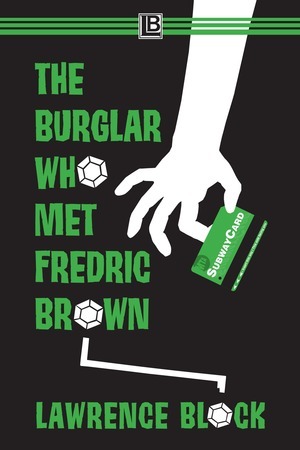 Well, somebody ought to. You’ve got a new book coming out, the so-long-awaited-that-people-gave-up-and-stopped-waiting return of Bernie Rhodenbarr, and you’ve been determined to keep the whole enterprise a secret.
Well, somebody ought to. You’ve got a new book coming out, the so-long-awaited-that-people-gave-up-and-stopped-waiting return of Bernie Rhodenbarr, and you’ve been determined to keep the whole enterprise a secret.
That’s not true. I’m very happy with the way The Burglar Who Met Fredric Brown turned out, and I was eager to make it available for preorder, and I’m pleased to report that it’s getting preordered left and right, in both ebook and paperback. The release date for both is October 18—
That’s less than two months away.
I know. And that same day, Richard Ferrone’s audio version will be available from Recorded Books. With all of that going on, I should at the very least have been putting my nose to the grindstone and my shoulder to the wheel. But I wasn’t doing that, and I felt guilty enough about it to say yes to a sit-down with the Impertinent Interviewer.
Always a mistake.
You’d think I’d learn. It wasn’t the most fun I’ve ever had with my clothes on, but I have to say it came out surprisingly well, and brought the book some nice publicity when Janet Rudolph reproduced it on Mystery Fanfare. It’s too long to run here, but I’ve posted it on my website.
You’re a brave man, because it does make you look a little foolish. But I guess you’d look even sillier with your nose to the grindstone and your shoulder to the wheel, and the theory you float about parallel universes is sort of interesting.
Just sort of?
Well, I read all the way through it without yawning. But if it had been a couple of sentences longer—
Never mind. I’ve also sent out review galleys to some bloggers and reviewers, and the book is already receiving some welcome comments, and if I were better organized I could share some of them with you now—
But you’re not and you can’t.
Evidently. But here’s a rave that just came in, Colman Keane’s take on the audiobook of Hunting Buffalo with Bent Nails:
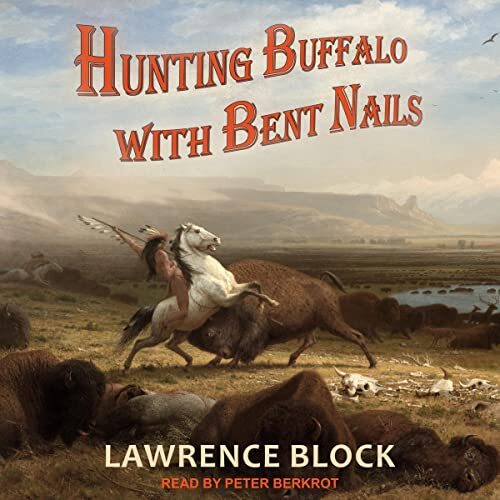 “A fantastic collection of bits and pieces from a favourite author, Lawrence Block. Essays and recollections of family, travelling at home and abroad, memories of other authors, friendships and some of their books, plenty of bits and bobs on New York and his long association with the city. Entertaining, never less than interesting, great narration and a wonderful accompaniment to numerous commutes and exercise runs.“
“A fantastic collection of bits and pieces from a favourite author, Lawrence Block. Essays and recollections of family, travelling at home and abroad, memories of other authors, friendships and some of their books, plenty of bits and bobs on New York and his long association with the city. Entertaining, never less than interesting, great narration and a wonderful accompaniment to numerous commutes and exercise runs.“
And I love this part: “Superb narration from Peter Berkrot. At times it felt like I had great company in the car with me, regaling me with interesting anecdotes and memories.”
That’s lovely, and Peter deserves it. But didn’t Hunting Buffalo come out in 2019?
So? I’ve been busy with something else. I’m at the gym every day, picking up heavy metal objects and putting them back where I found them—
That sounds pointless.
It does, doesn’t it? And I’ve been walking five or six miles a day so I won’t have to listen to more lectures from my Fitbit.
Where do you do this? In the park?
Sometimes, and sometimes on the treadmill, which you’ll probably say is pointless—
It’s all pointless.
—but on the treadmill I don’t have to worry about getting lost. Oh, there’s no way to avoid this. One reason I‘m jammed for time is that—oh, rats, do I have to say it?
Say it.
All right. I’m Writing Something.
But—
I know.
You just wrote something. Out of the blue, and much to everyone’s surprise, not least of all your own, you wrote The Burglar Who Met Fredric Brown. When did you wrap that one up?
End of April.
And it’s not even published yet, and here you are writing Something Else. Is that the title? Something Else?
It hasn’t got a title.
I hope it’s nothing too ambitious. A haiku? A sonnet?
I don’t want to say.
You don’t want to say whether or not it’s a haiku? Can’t you just give me a yes or a no in seventeen syllables?
It’s too long for a haiku. It just passed the 30,000-word mark, and I’d guess it’s about halfway done.
So it’s going to be a book.
I’m afraid so.
What can you tell us about it?
Nothing.
That’s a big help. Well, is it fiction or nonfiction?
I’m not sure.
Really? You can’t tell whether you’re lying or telling the truth? Maybe you should run for office. When do you expect to finish this indefinable work of genius?
I don’t know. And what difference does it make? I’ll just sit down again and start writing something else.
You’ve got something in mind?
No, but I didn’t have this in mind, either. An empty mind is evidently like a blank sheet of paper. Some pestilential force always comes along and mucks up all the beautful empty spaces with words.
So why don’t I go ahead and wrap this up with a preorder pitch for The Burglar Who Met Fredric Brown? If you preorder the ebook, you’ll be locking in the preorder price of $9.99—which may increase after publication. Preordering the paperback also guarantees you’ll get it for $17.99—and that price is almost certain to go up after publication date, probably by two dollars.
Of course the best way to save money is to skip the book altogether. How hard is it to find something good on TV?
Thanks a lot. Did you take lessons from the Impertinent Interviewer? Here are the preorder links: Amazon Barnes & Noble Apple Kobo Thalia Vivlio
And I just click on the link of my choice? And then what? Bob’s my uncle?
And Roberta’s your aunt, and Fredric Brown and Bernie Rhodenbarr are in your future, even as I am forever in your debt.
Meanwhile, I’m out of here.
Cheers,

PS: As always, please feel free to forward this to anyone you think might find it of interest. And, if you yourself have received the newsletter from a friend and would like your own subscription, that’s easily arranged; an email to lawbloc@gmail.com with LB’s Newsletter in the subject line will get the job done.
LB’s Blog and Website
LB’s Facebook Page
Twitter: @LawrenceBlock
August 16, 2022
An Impertinent Interview with Lawrence Block
Note: I couldn’t tell you what I was thinking when I agreed to a session with the chap who calls himself the Impertinent Interviewer, but I knew the result would be prominently posted in Janet Rudolph’s Mystery Fanfare site, so it seemed worth the effort. While I think I’ll choose to avoid Impertinent Interviews in the future, this one got into some interesting territory:
You’re listening to the Impertinent Interviewer, and my guest today is Lawrence Block, author of over 200 books. That’s enough to fill a pretty extensive set of shelves, wouldn’t you say?
Uh—
Or, more likely, a dozen cartons at a garage sale in a bad neighborhood, eh? Eh? LB is here today in aid of his new book, the latest entry in his Bernie Rhodenbarr series. Could you tell us the title?
It’s called The Burglar Who Met Fredric Brown.
And it’s the 13th book in the series, but only the 12th novel. How do you explain that?
The book preceding it, The Burglar in Short Order—
Right, never miss a chance to mention a title. Go on.
—is a collection of four Bernie Rhodenbarr short stories, plus some book excerpts that seem to work well on their own, along with a selection of essays and newspaper op-ed pieces that feature Bernie, and—
Why does it sound like the kind of meatloaf you make after you sweep the kitchen floor? Hey, I’m the Impertinent Interviewer. What did you expect when you agreed to come on the program?
Well, I—
That was a rhetorical question, LB. You’re not supposed to answer it. Let’s move right along, shall we? I’m one of the fifteen people in America who actually read The Burglar in Short Order, and it winds up with Bernie explaining exactly why there won’t be any more books. The world has changed, it’s no place for a burglar or a bookseller, and he’s stuck with what he’s got, never getting a day older and no longer able to get anywhere in his two chosen professions. Did I get that right?
Close enough.
And here you are with another book—
The Burglar Who Met Fredric Brown.
—and another plug for another title, sheesh, what is it with you? Never mind, don’t answer that. Fredric Brown. Sensational writer, a whole lot better than you, and equally at home in science fiction and mystery. You ever write any SF?
I had a story in a magazine, Science Fiction Stories, in 1959, and it was chosen for Judith Merril’s best-of-the-year collection. And in 1984 Fantasy & Science Fiction ran “The Boy Who Disappeared Clouds.”
Two stories twenty-five years apart. Doesn’t exactly put you up there with Sturgeon and Asimov, does it?
I never said—
Never mind. Fredric Brown was born in 1906 and died in 1972, and Bernie first showed up in 1977 in Burglars Can’t Be Choosers, so how could they possibly meet? Answer: Time travel, right? You’ve written a time travel story and Bernie goes back in time, knocks back a couple of drinks with Fred B., and breaks into houses back before anybody even dreamed about pickproof locks and security cameras. Am I right?
No.
No? Why the hell not?
Because there’s no such thing as time travel. It’s a viable literary device, and writers from H. G. Wells to Audrey Niffenegger have made remarkable use of it, but how can anybody with even one foot on the ground take it seriously? It’s not real. The past is over—
Oh really? Faulkner says it’s not even past.
—and the future hasn’t happened yet. So no, The Burglar Who Met Fredric Brown is emphatically not a time-travel story.
You’re saying it’s set in the here-and-now? . . .Um, hello? Earth to LB: That wasn’t a rhetorical question. You’re supposed to answer it.
It’s set in the Now.
But not in the Here, not exactly. Hey, I read the damn book, okay? I know what you did here. The book takes place in a parallel universe. Bernie falls asleep reading a Fredric Brown novel, and he wakes up in a world that looks just like this one—except it’s different.
Right.
No security cameras documenting your every move. No pickproof locks rendering your talents obsolete. No online booksellers ruining your retail trade.
Right.
And no Metrocards. What the hell have you got against Metrocards?
I—
Never mind. There’s no such thing as time travel, you wouldn’t dream of writing a time-travel story, but you’re fine with parallel universes? How do you explain that?
Why do I have to? I don’t believe in time travel.
But you do believe in parallel universes?
Of course. So do you.
Me?
You and everybody else who reads fiction. Every novel takes place in a parallel universe all its own, and that’s as true of the grittily realistic novel as it is of the most whimsical flight of fantasy. Take my Matthew Scudder novels, for example.
I don’t believe it. You just found a way to plug a whole other series.
They’re set in New York City, over a span of time from the early 1970s to the present. The protagonist, Matthew Scudder, ages in real time. He’s fifty years older now than he was when I first began writing about him.
So how’s that a parallel universe?
In the world you and I inhabit, I’m a writer, and Matthew Scudder is a character in some of the books I write. In the world of the novels, I don’t exist, and neither do the books, and Matthew Scudder is a living person recounting an actual series of incidents.
I’m trying to get my mind around this. So in the Bernie Rhodenbarr books—
He’s been living all his life in a universe that exists alongside ours. If you walk over to the block of East Eleventh Street between University Place and Broadway, you won’t find a store called Barnegat Books, with a tailless cat dozing in the front window. Nor will you find The Poodle Factory, Carolyn Kaiser’s place of business. In one world those establishments exist. In another, they’re just something for me to write about and you to read about.
But this world is real, and the world of the books—
Isn’t? That’s certainly how you would see it. Bernie, on the other hand, would probably view it differently. He’d say his day-to-day world is the real one.
But then he wakes up in another world, a parallel universe. And does he think the new world is real?
Sure. But maybe not quite as real as the original one, and with some interesting wrinkles. You know, every couple of months someone will turn up with an idea for me: Why don’t I write a book where Bernie and Matt are both characters? Or Bernie and Keller, or Keller and Matt, or whatever. It’s always the same idea, and each person who proposes it thinks he’s the first to come up with it. “Bernie steals Keller’s stamp collection! Wouldn’t that be great?” Well, no, it wouldn’t, but whatever the idea may be I have the same response. My various characters can’t meet because they live in different worlds. Bernie and Matt may both live in New York, but it’s a different New York for each of them, in a different universe.
Far out. I ask you what time it is, figuring you’ll tell me how to build a watch. And instead you explain to me how there’s no such thing as time.
Not exactly.
No, not exactly, but close enough. But here’s a thought. Your characters can’t meet because they live in different worlds.
That’s what I just said.
So there’s no way Chip Harrison can wind up in the sack with Kit Tolliver.
God, what a thought.
Well, I’m the Impertinent Interviewer, remember? And here’s another thought. There’s an infinite number of parallel universes, right? So Chip lives in his universe, and Kit lives in hers.
So?
So let’s suppose there’s another world, parallel to both of theirs, in which they’re both present. Isn’t that as possible as anything else we’ve been talking about? Never mind, it’s only a thought, and an impertinent one at that. Whatever it is you want to say, keep it to yourself, okay? We’re out of time. This is the Impertinent Interviewer, saying goodbye, and don’t let the door hit you in the ass on your way out.
#
Lawrence Block’s new Bernie Rhodenbarr novel, The Burglar Who Met Fredric Brown, is available for preorder in advance of its ebook and paperback publication on October 18. Sometime in 2023, look for a signed-and-numbered limited hardcover edition from Subterranean Press.



